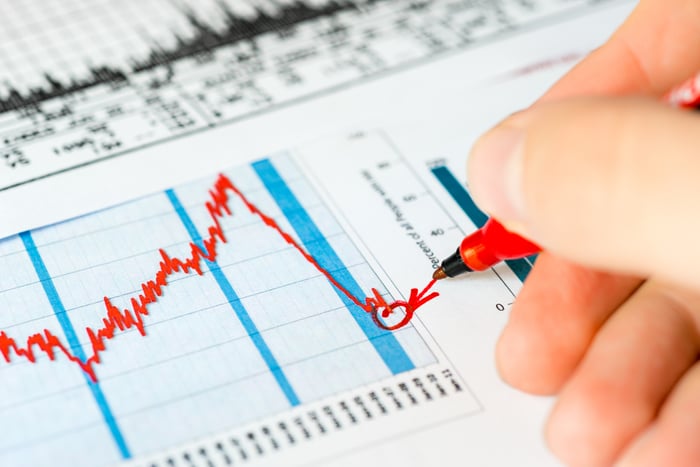|
|
|

|
|||||

|
|
Shares of quantum computing pure-play stocks IonQ, Rigetti Computing, D-Wave Quantum, and Quantum Computing Inc. have skyrocketed up to 3,170% over the trailing year.
All game-changing technologies require ample time to mature, which is something investors continually overlook.
Furthermore, quantum computing is years away from meaningful commercialization and solution optimization, which bodes poorly for existing valuations.
Artificial intelligence (AI) is a potentially game-changing technology that can add $15.7 trillion to the global economy by 2030, based on an estimate from PwC. But it's also a technology that's far from perfect and facing its fair share of headwinds.
Yet when it comes to the prospect of bubbles forming and bursting on Wall Street, nothing screams frothy quite like trailing-12-month returns of up to 3,170% (as of the closing bell on Oct. 31) for the likes of quantum computing stocks IonQ (NYSE: IONQ), Rigetti Computing (NASDAQ: RGTI), D-Wave Quantum (NYSE: QBTS), and Quantum Computing Inc. (NASDAQ: QUBT).
Where to invest $1,000 right now? Our analyst team just revealed what they believe are the 10 best stocks to buy right now, when you join Stock Advisor. See the stocks »
These nascent pure-play stocks are now sporting market caps ranging from $3.7 billion for Quantum Computing Inc. to $21.7 billion for IonQ -- and there isn't a shred of data or an ounce of historical precedent that supports such lofty valuations.

Image source: Getty Images.
Before I lay the groundwork for why this is Wall Street's biggest bubble waiting to burst, it's important to understand the "how?" and "why?" behind the parabolic ascents in the shares of IonQ, Rigetti Computing, D-Wave Quantum, and Quantum Computing Inc.
Quantum computing relies on specialized computers and the theories of quantum mechanics to solve complex problems that traditional computers, and even supercomputers, are unable to do. The potential utility of quantum computers clearly has investors excited.
A few of the real-world use cases for quantum computers include:
Although estimates vary wildly, as you'd expect from a relatively new technology, online publication The Quantum Insider sees this tech creating $1 trillion in economic value 10 years from now.
This quantum computing quartet of IonQ, Rigetti, D-Wave, and Quantum Computing Inc. has also been lifted by the prospect of partnerships and/or financing. On Oct. 23, The Wall Street Journal reported that the Donald Trump administration was in talks to take equity stakes in quantum computing stocks.
Meanwhile, the quantum cloud computing services offered by Amazon (Braket) and Microsoft (Azure Quantum) are both allowing subscribers access to quantum computers from IonQ and Rigetti Computing. This early stage association with some of Wall Street's most-influential businesses is helping to put quantum computing solutions on the map.
The final piece of the puzzle is "FOMO," or the fear of missing out. This is an emotion- and momentum-driven component to investing that can lead to parabolic run ups in stocks.

Image source: Getty Images.
To be clear, there isn't a metric or historical correlation that can accurately predict when the music will stop for a hyped trend.
For instance, former Fed Chair Alan Greenspan coined the term "irrational exuberance" in December 1996 to describe the rapid appreciation of equities following the advent and proliferation of the internet. However, the stock market didn't peak until more than three years later (March 2000).
The point being that it's impossible to precisely forecast when the music will stop for quantum computing stocks. But what I can say with some degree of confidence is that, at some point in the presumed not-too-distant future, the bubble will burst for this hyped trend.
To begin with, every next-big-thing technology for more than three decades has endured an early innings bubble-bursting event. While the advent and adoption of the internet was instrumental in opening new doors for businesses and paving the way for the retail investor revolution, it took years before businesses figured out how to optimize this technology and generate a positive return on their investment.
Investors have consistently overestimated how quickly a touted game-changing technology would gain widespread utility or be adopted by businesses and/or consumers. We've witnessed this with the internet, nanotechnology, 3D printing, blockchain technology, the metaverse, and will very likely see this happen with AI, as well.
Most quantum computing solutions are still in the developmental or very early commercialization stage. Few (if any) businesses have figured out how to optimize quantum computing services, and it's not clear if any are generating a positive return on their investments, as of yet. These are all very clear signs of an eventual bubble that's going to burst.
Another telltale sign that quantum computing is Wall Street's biggest bubble can be seen in the valuation of its pure-play stocks.
Although it's difficult to evaluate early stage businesses -- the traditional price-to-earnings (P/E) ratio is rendered useless for money-losing/developmental companies -- the price-to-sales (P/S) ratio offers insight.
Looking back to the dot-com bubble, companies that were leading the internet revolution frequently peaked at P/S ratios in the general range of 30 to 40. Subsequent hyped trends also revealed this range to be unsustainable for industry-leading businesses.
Based on consensus sales projections for 2027 (i.e., allowing quantum computing services to become commercialized) yields the following estimated P/S ratios for Wall Street's quantum computing darlings:
Not even triple-digit annual sales growth over the next two years would be able to justify the existing valuations for any of these quantum computing stocks.
What's more, this is the second-priciest stock market in history, based on the S&P 500's Shiller P/E Ratio. History tells us that Shiller P/E multiples north of 30 eventually lead to declines in the S&P 500 of at least 20%. Last week, the Shiller P/E touched 41.20.
When stock market corrections, bear markets, or elevator-down moves occur, companies with premium valuations tend to be hit the hardest. Quantum computing stocks are going to have a bullseye on their proverbial backs when the next broad-market downturn occurs.
Before you buy stock in IonQ, consider this:
The Motley Fool Stock Advisor analyst team just identified what they believe are the 10 best stocks for investors to buy now… and IonQ wasn’t one of them. The 10 stocks that made the cut could produce monster returns in the coming years.
Consider when Netflix made this list on December 17, 2004... if you invested $1,000 at the time of our recommendation, you’d have $593,269!* Or when Nvidia made this list on April 15, 2005... if you invested $1,000 at the time of our recommendation, you’d have $1,268,146!*
Now, it’s worth noting Stock Advisor’s total average return is 1,076% — a market-crushing outperformance compared to 195% for the S&P 500. Don’t miss out on the latest top 10 list, available when you join Stock Advisor.
*Stock Advisor returns as of November 3, 2025
Sean Williams has positions in Amazon. The Motley Fool has positions in and recommends Amazon and Microsoft. The Motley Fool recommends the following options: long January 2026 $395 calls on Microsoft and short January 2026 $405 calls on Microsoft. The Motley Fool has a disclosure policy.
| Feb-24 | |
| Feb-24 | |
| Feb-24 | |
| Feb-24 | |
| Feb-24 | |
| Feb-24 | |
| Feb-24 | |
| Feb-23 | |
| Feb-23 | |
| Feb-23 | |
| Feb-23 | |
| Feb-23 | |
| Feb-23 | |
| Feb-23 | |
| Feb-23 |
Join thousands of traders who make more informed decisions with our premium features. Real-time quotes, advanced visualizations, backtesting, and much more.
Learn more about FINVIZ*Elite